Recommendation Letter For Professor Or Faculty Position
[Your Name]
[Your Title/Position]
[Your Institution/Organization]
[Your Email Address]
[Your Phone Number]
[Date]
[Recipient's Name]
[Recipient's Title]
[Department/Institution]
[Address]
Subject: Recommendation for [Applicant's Name] for a Professor/Faculty Position
Dear [Recipient's Name],
I am writing this letter to wholeheartedly recommend [Applicant's Name] for a professor/faculty position within your esteemed institution. I have had the pleasure of working closely with [Applicant's Name] and can attest to their exceptional qualities as a scholar, educator, and researcher.
[Applicant's Name] has demonstrated outstanding academic achievements throughout their academic career. Their expertise in [applicant's field of study] is both broad and deep, and they have consistently displayed an eagerness to explore new areas of research and to share their knowledge with others. Their scholarly work is innovative, rigorous, and has garnered recognition within the academic community.
As an educator, [Applicant's Name] is passionate about teaching and has a natural ability to engage students effectively. They employ a variety of teaching techniques, ensuring that the material is accessible and stimulating for learners of diverse backgrounds and abilities. [Applicant's Name] is deeply committed to the growth and development of their students, and I have witnessed them invest significant time and effort in mentoring and supporting individual learners.
Beyond their academic excellence and teaching prowess, [Applicant's Name] is a team player and an asset to any collaborative research or academic project. They actively contribute to the intellectual community by participating in seminars, conferences, and academic discussions. Their ability to work collaboratively and foster a positive academic environment makes them an ideal fit for any faculty team.
[Applicant's Name] possesses exemplary communication skills, both written and verbal, and has a remarkable ability to convey complex ideas with clarity and enthusiasm. These skills extend beyond the classroom as they have proven to be an effective communicator when presenting research findings and representing their field at conferences and workshops.
In summary, I have no doubt that [Applicant's Name] would make a tremendous contribution to your institution as a professor/faculty member. Their dedication to teaching, research, and academic service is evident, and I wholeheartedly recommend their appointment without reservation.
Please feel free to contact me if you require any additional information or further discussion about [Applicant's Name]. Thank you for considering this recommendation. I am confident that [Applicant's Name] will continue to excel and make significant contributions to the academic community.
Sincerely,
[Your Name]
[Your Title/Position]
[Your Institution/Organization]
Formal Recommendation Letter for Faculty Position
Subject: Recommendation for [Candidate Name]
Dear [Recipient Name],
I am pleased to write this letter recommending [Candidate Name] for the position of [Faculty Position] at [University/Institution Name]. Having worked closely with [Candidate Name] for [duration] in the capacity of [Your Position], I have observed exceptional teaching skills, scholarly achievements, and dedication to academic excellence.
[Candidate Name] has consistently demonstrated the ability to engage students, foster critical thinking, and contribute meaningfully to curriculum development. Their research contributions, including [mention notable publications or projects], highlight both depth and innovation in their field.
I am confident that [Candidate Name] will bring valuable expertise, commitment, and leadership to your faculty. Please do not hesitate to contact me for further information.
Sincerely,
[Your Name]
[Position]
[Institution]
[Contact Information]
Heartfelt Recommendation Letter for Professor
Subject: Strong Recommendation for [Candidate Name]
Dear [Recipient Name],
It is my privilege to recommend [Candidate Name] for the [Faculty Position] at your esteemed institution. Over the past [years], I have witnessed their unwavering dedication to student success, rigorous research, and mentoring of junior faculty.
[Candidate Name] possesses a unique ability to inspire, challenge, and nurture students, creating a classroom environment that encourages curiosity and intellectual growth. Their collaborative spirit and academic integrity make them an invaluable asset to any department.
I wholeheartedly endorse [Candidate Name] and am confident in their ability to make lasting contributions to your institution.
Warm regards,
[Your Name]
[Title]
[Department/Institution]
[Contact Information]
Preliminary Recommendation Letter for Faculty Application
Subject: Preliminary Recommendation for [Candidate Name]
Dear [Recipient Name],
I am writing this preliminary recommendation for [Candidate Name] as they apply for the [Faculty Position] at [Institution Name]. Based on my interactions and observations over the last [duration], I can attest to their scholarly capabilities, effective teaching style, and professional integrity.
This initial recommendation is intended to provide an overview of [Candidate Name]'s qualifications. I would be pleased to provide a more detailed reference if needed.
Thank you for considering this recommendation.
Best regards,
[Your Name]
[Position]
[Contact Information]
Recommendation Letter Highlighting Research Excellence
Subject: Recommendation for [Candidate Name]
Dear [Recipient Name],
I am delighted to recommend [Candidate Name] for the [Faculty Position] at [University]. Their research in [field/area] has consistently demonstrated innovation, rigor, and substantial contribution to the academic community.
Notably, [Candidate Name] has published [number] articles in high-impact journals and presented at numerous international conferences. Their research vision and ability to secure funding for projects exemplify a leader in academia.
I strongly endorse [Candidate Name] for your consideration.
Sincerely,
[Your Name]
[Position]
[Institution]
[Contact Information]
Recommendation Letter for Teaching Excellence
Subject: Teaching Recommendation for [Candidate Name]
Dear [Recipient Name],
I am honored to recommend [Candidate Name] for the [Faculty Position] at [University]. Their exceptional teaching methods, dedication to student learning, and ability to develop innovative curriculum make them highly qualified for this role.
Students consistently provide positive feedback on [Candidate Name]'s ability to explain complex concepts and engage the classroom in meaningful discussions. Their mentorship extends beyond the classroom, fostering both personal and professional growth.
I am confident that [Candidate Name] will significantly enhance the teaching standards of your department.
Kind regards,
[Your Name]
[Position]
[Institution]
[Contact Information]
Who Should Write a Recommendation Letter for Professor
Who Should Write a Recommendation Letter for Professor
- Current or former department chairs.
- Senior faculty members familiar with the candidate's work.
- Academic supervisors or research advisors.
- Colleagues who have closely collaborated with the candidate in teaching or research.
- Individuals in a leadership position who can assess the candidate's academic impact.
When to Send a Recommendation Letter for Faculty Positions
When to Send a Recommendation Letter for Faculty Positions
- During application to academic positions at universities or colleges.
- When a candidate is applying for tenure-track or visiting faculty roles.
- For promotion or internal departmental appointments.
- When a candidate is seeking research grants or fellowships requiring faculty endorsement.
- Prior to reference checks requested by academic committees.
How to Write an Effective Recommendation Letter for Faculty
How to Write an Effective Recommendation Letter for Faculty
- Start with a clear introduction stating your relationship with the candidate.
- Highlight specific achievements in research, teaching, and service.
- Provide concrete examples of leadership, mentorship, and scholarly contributions.
- Maintain a professional and respectful tone throughout.
- Include your contact information for follow-up questions.
Formatting and Style Guidelines for Faculty Recommendation Letters
Formatting and Style Guidelines for Faculty Recommendation Letters
- Length: Typically 1–2 pages; comprehensive yet concise.
- Tone: Professional, formal, and supportive.
- Structure: Introduction, teaching and research accomplishments, personal qualities, summary endorsement, closing.
- Mode: Printed letters or formal email, depending on application instructions.
- Etiquette: Avoid exaggeration; maintain honesty while highlighting strengths.
Tricks and Tips for Writing Strong Faculty Recommendations
Tricks and Tips for Writing Strong Faculty Recommendations
- Personalize the letter with specific examples of achievements.
- Emphasize both research and teaching competencies.
- Include measurable outcomes where possible, such as student evaluations or publications.
- Ensure clarity and logical flow for easy readability.
- Proofread carefully to maintain credibility and professionalism.
Common Mistakes in Faculty Recommendation Letters
Common Mistakes in Faculty Recommendation Letters
- Using generic or vague language without concrete examples.
- Focusing solely on one aspect (teaching or research) while ignoring others.
- Overly lengthy letters that dilute key points.
- Neglecting to mention how the candidate aligns with the specific institution or role.
- Failing to proofread, leading to grammatical or factual errors.
Elements and Structure of a Faculty Recommendation Letter
Elements and Structure of a Faculty Recommendation Letter
- Introduction: Relationship with the candidate and context.
- Teaching Accomplishments: Classroom effectiveness, mentorship, curriculum development.
- Research Achievements: Publications, grants, scholarly impact.
- Service and Leadership: Departmental roles, committees, outreach.
- Personal Qualities: Integrity, collaboration, communication skills.
- Summary and Endorsement: Clear recommendation statement.
- Closing: Contact information and willingness for further discussion.
Pros and Cons of Sending Faculty Recommendation Letters
Pros and Cons of Sending Faculty Recommendation Letters
Pros:
- Strengthens the candidate's application.
- Highlights specific achievements to selection committees.
- Demonstrates professional support and mentorship.
Cons:
- Requires careful thought and time to write effectively.
- Risk of overstatement if not factual.
- May reflect on the recommender if the letter is poorly constructed.
FAQ: Faculty Recommendation Letters
FAQ: Faculty Recommendation Letters
- Q: Can a letter be sent via email?
A: Yes, if the institution allows digital submissions; otherwise, print letters may be required. - Q: How long should the letter be?
A: Typically 1–2 pages. - Q: Should research or teaching be emphasized more?
A: Include both, tailored to the position requirements. - Q: Can multiple faculty members submit letters?
A: Yes, diverse perspectives strengthen the application.

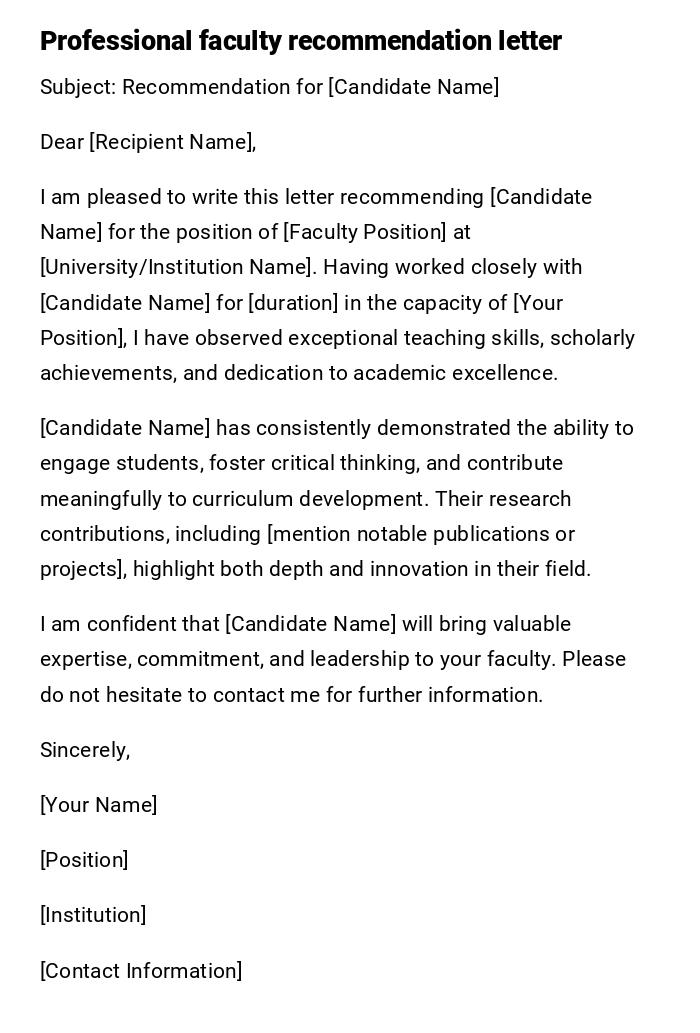
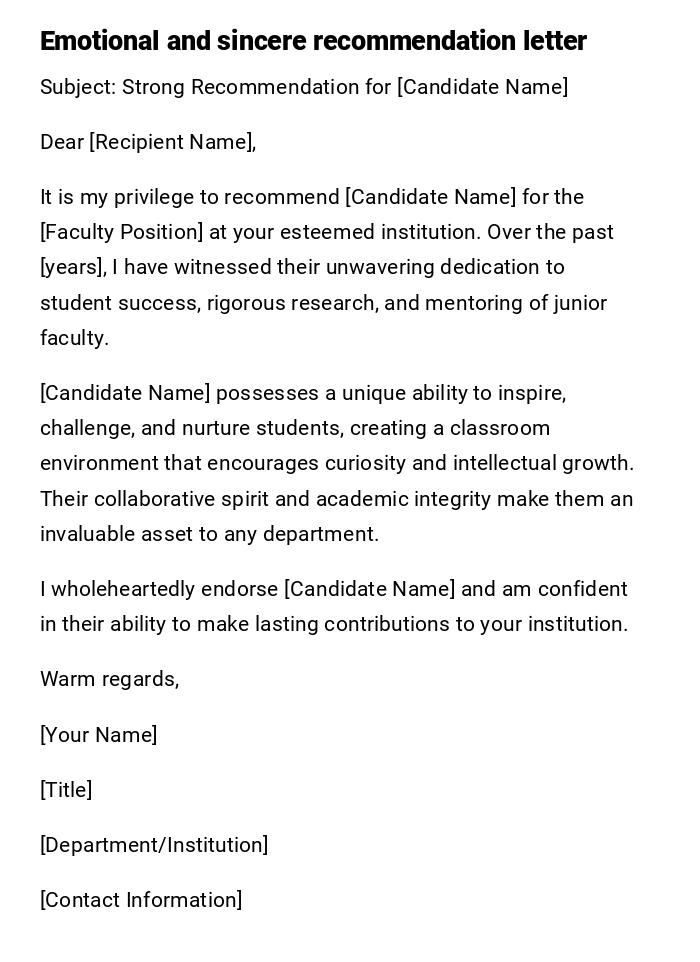
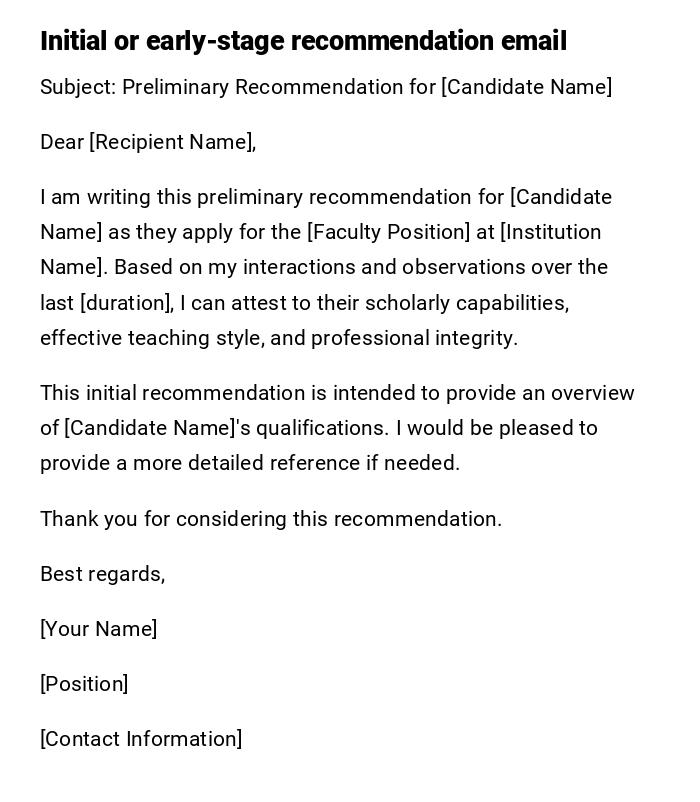
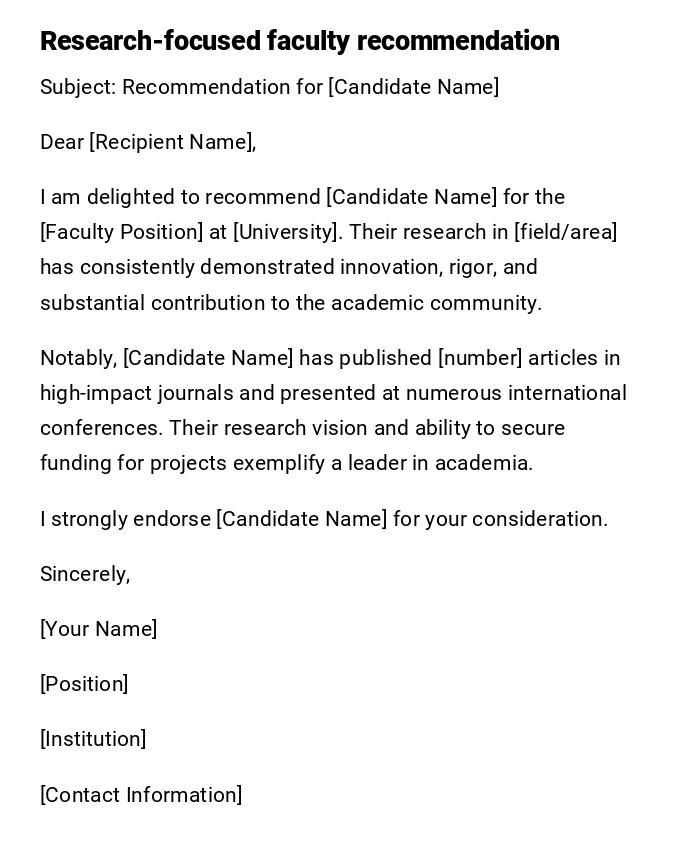
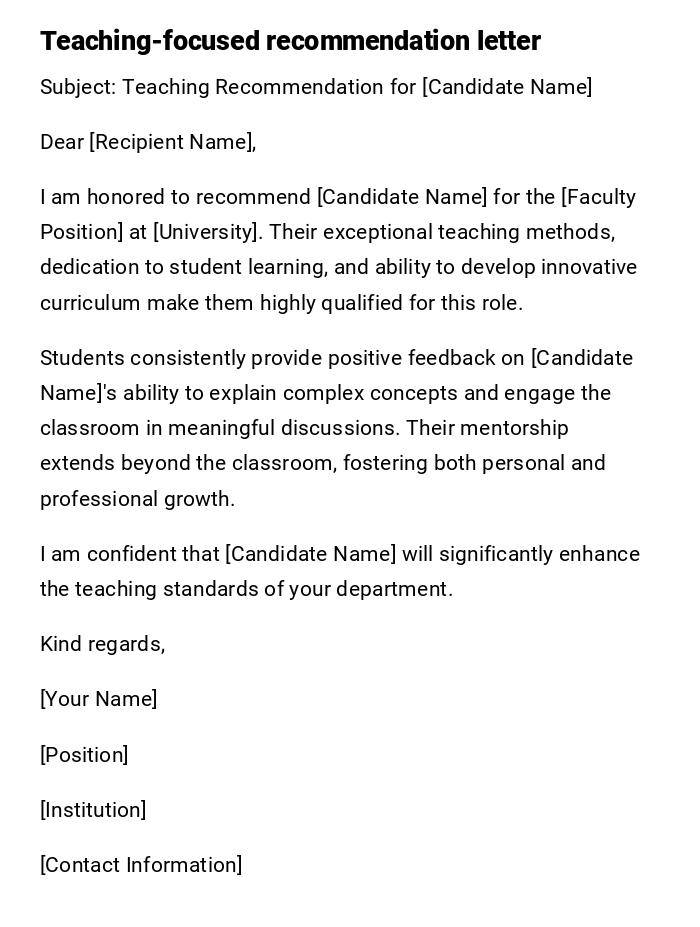

 Download Word Doc
Download Word Doc
 Download PDF
Download PDF